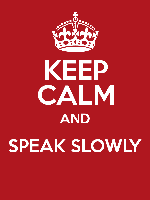 I ran across an excellent article about effective communication: “Why you must learn to speak slower” by Andrew Lightfoot with Cobalt. Andrew is not an attorney — he’s probably never been to a deposition. But he is a professional speaker, and he understands effective (and ineffective) communication.
I ran across an excellent article about effective communication: “Why you must learn to speak slower” by Andrew Lightfoot with Cobalt. Andrew is not an attorney — he’s probably never been to a deposition. But he is a professional speaker, and he understands effective (and ineffective) communication.
One of his most interesting observations is that speaking slower helps you be more in control. I’ve witnessed first-hand how quickly a deposition can unravel as the questioner starts jumping on the answers and the witness starts talking faster and faster in an effort to get their entire answer out before they are cut off. As a court reporter, I try not to interrupt, but there comes a point where I have to call a halt because I literally cannot hear, let alone write, all the words being said. And since they are all being said at the same time, both speakers feel compelled to talk louder and louder. End result? Chaos.
Don’t get me wrong. I’m a court reporter and I pride myself on being able to keep up with the fast-talkers. But there is a point of diminishing returns. Being the fastest talker in the room may make you feel like you’re in charge, but there’s a lot to be said for being in control.
In order to avoid last-minute deposition scheduling problems, download our Deposition Scheduling Report and Checklist.